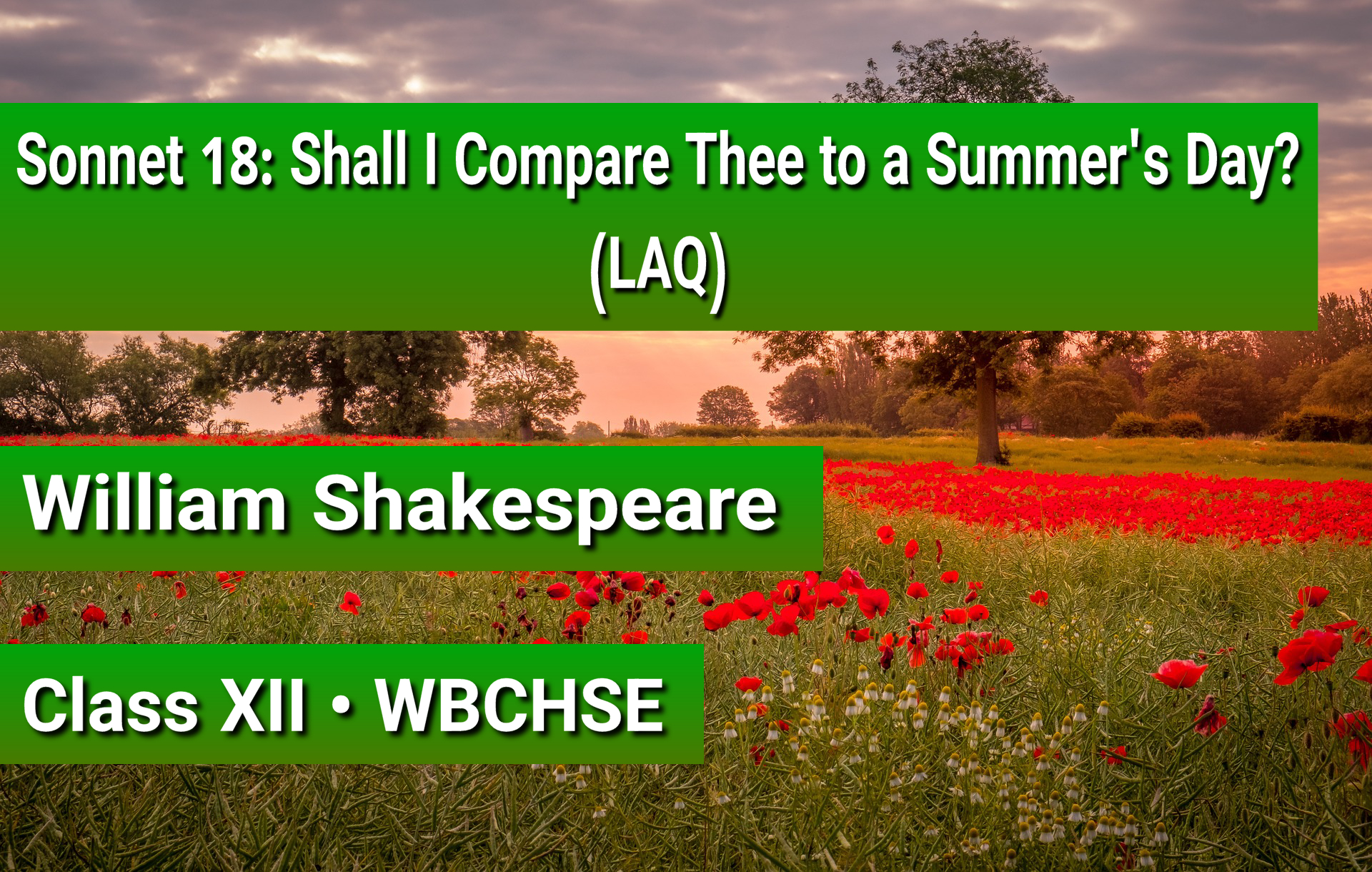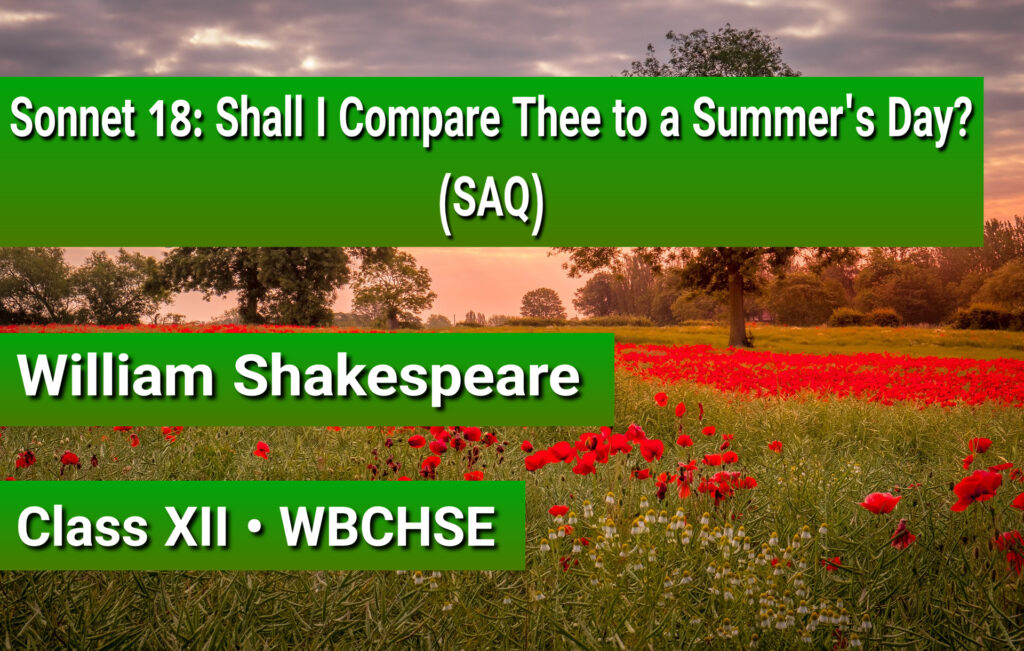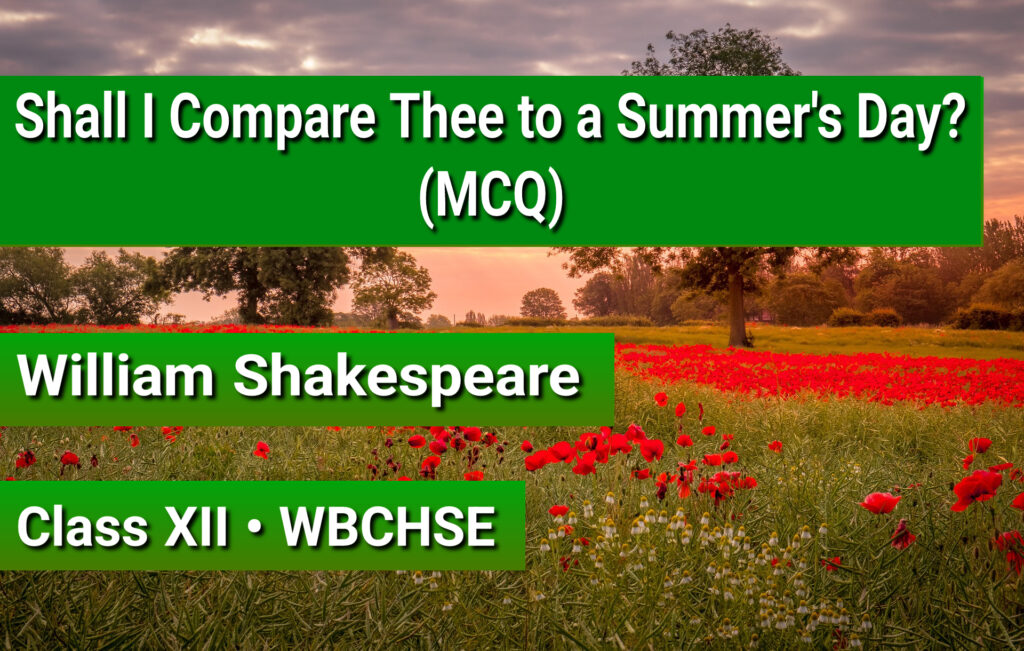Here we discussed William Shakespeare‘s Sonnet No 18 – Shall I Compare Thee to a Summer’s Day Long Questions and Answers.
Shall I Compare Thee to a Summer’s Day Long Questions and Answers

Shall I Compare Thee to a Summer’s Day LAQ
(1) How does Shakespeare compare the beauty of his friend to that of a summer’s day? [6] [H.S. 2016]
Ans. In his Sonnet 18, Shakespeare compares the beauty of his friend to that of a summer’s day, but ultimately concludes that his friend’s beauty is more lovely and temperate than summer’s day. The beauty of summer is not permanent. The sun shines brightly but sometimes its ‘gold complexion’ is dimmed by clouds. Rough wind shakes the sweet buds. The duration of summer is too short. But his friend’s beauty remains constant, unchanging, and will be remembered forever. Shakespeare uses the comparison of a summer’s day to highlight his friend’s eternal beauty.
(2) “But thy eternal summer shall not fade.” – Who is being referred to as ‘thy’? What is meant by ‘eternal summer’? Why shall not ‘thy eternal summer’ fade? [1+1+4] [H.S. 2019]
Ans. In Shakespeare’s Sonnet No 18, the poet’s friend is referred to as ‘thy’.
The everlasting youth and beauty of of the poet’s friend is meant by ‘eternal summer’.
The poet boldly declares that ‘thy eternal summer shall not fade.’ He is confident that his friend’s youth and beauty is everlasting. The beauty of his friend will be preserved forever through his verses. This poetry will make his beloved friend immortal. As long as people continue to read his sonnet, the young man’s beauty will continue to live on. It will keep his memory alive long after he is gone.
(3) “But thy eternal summer shall not fade.” – Who is the poet? What is meant by ‘eternal summer’? How does the poet suggest that ‘thy eternal summer’ shall never end? [1+1+4] [H.S. 2015]
Ans. William Shakespeare is the poet, and the quoted line is taken from his Sonnet No 18.
See the answer of question No. 2 for the last two part of the question.
(4) “But thy eternal summer shall not fade Nor lose possession of that fair thou ow’st.” – Whose ‘eternal summer’ is being referred to here? What does ‘eternal summer’ mean? What conclusion does the poet draw at the end of his poem? [1+2+3] [H.S. 2017]
Ans. ‘Eternal summer’ of Shakespeare’s friend is being referred to here.
‘Eternal summer’ means the everlasting beauty and youth of the poet’s friend.
The poet wants to preserve his friend’s beauty from the nature’s changing course through his verses. At the end of the poem, the poet declares is that his beloved’s beauty will remain eternal as long as the poem is read. The lines composed by him will glorify his friend’s beauty. Thus, the poet ended the poem in an optimistic way.
(5) What do the rough winds do? What does the poet mean by ‘summer’s lease’? How is the friend’s beauty superior to the summer’s day? [1+1+4] [H.S. 2020]
Ans. The rough winds shake the darling buds.
By ‘summer’s lease’, the poet means that the duration of summer is too short. Summer is a temporary season, and its beauty is fleeting.
The poet argues that his friend’s beauty is superior to that of a summer’s day because it is more constant and eternal. While the beauty of summer fades with time. The rough winds destroy the beautiful buds. The duration of summer is too short. Sometimes the sun shines brightly and sometimes it is dimmed by clouds. So, summer has many drawbacks. On the other hand, the beauty of the poet’s friend is everlasting.
(6) “And every fair from fair sometime declines.” – From which poem is the line quoted? Who is the poet? Briefly explain the meaning of the quoted line. How does the poet promise to immortalize his friend’s beauty? [1+1+2+2] [H.S. 2018, 2022]
Ans. The quoted line is taken from Sonnet No 18, ‘Shall I compare thee to a summer’s day?’
The poet is William Shakespeare.
The line refers to the fact that every beautiful objects eventually fades and loses its charm over time. Everything is subjected to death and decay.
The poet is very much confident that his friend’s beauty shall not fade. He will make his friend’s glory everlasting through his verses. The poet boldly declares that as long as men continue to live on this earth, his poem will be read. In this way, his friend will be remembered and it will give life to him.
(7) “So long lives this, and this gives life to you.” – What does ‘this’ refer to here? Whom does ‘this’ give life to? How does the poet think that ‘this’ will give life to ‘thee’? [1+1+4] [H.S. 2022]
Ans. ‘This’ refers to the sonnet itself written by William Shakespeare.
‘This’ gives life to the poet’s friend, probably Henry Wriothesly, the Earl of Southampton.
The poet is confident of his poetry. Every beautiful objects of nature fades away by the passage of time. He will make his friend immortal through his verses. The poet boldly declares that as long as men continue to live on this earth, his poem will be read. In this way, his friend will be remembered and it will give life to him.
(8) What type of poem is “Shall I Compare Thee to a Summer’s Day?” What is its structure? What does the poet speak of? What does the poet say about the person referred to? [1+1+1+3] [H.S. 2023]
Ans. “Shall I Compare Thee to a Summer’s Day?” is a sonnet.
This is Shakespearean sonnet with three quartrains and a couplet.
The poet spakes of his dear friend, probably Henry Wriothesley, the Earl of Southampton.
Shakespeare dedicates this sonnet to his beloved friend. He states that the youth and beauty of his friend is more lovely and temperate than summer’s day. He glorifies his friend’s beauty with various images and metaphors. Everything on earth is subjected to death and decay but his friend’s beauty will remain unchanged. He will immortalize his friend through his poetry.
(9) Write the substance of William Shakespeare’s Sonnet No 18. [6]
Ans. In William Shakespeare’s Sonnet No 18, the speaker begins by questioning whether he should compare his beloved to a summer’s day, but ultimately concludes that the comparison would not be fair as the summer is fleeting and imperfect, whereas his beloved’s beauty is eternal. He then goes on to describe his beloved’s beauty in exquisite detail, using metaphor such as “Thou art more lovely and more temperate”. He also emphasizes that his beloved’s beauty will be immortalized through his poetry, stating “So long as men can breathe or eyes can see, / So long lives this, and this gives life to thee.” In essence, the sonnet is a celebration of the beauty of the beloved and the power of poetry to immortalize that beauty.
Read More:
• WBCHSE Class 12 English Chapter Wise Questions and Answers
• WBCHSE Class 12 English POETRY Chapter Wise Questions and answers
• WBCHSE Class 12 English PROSE Chapter Wise Questions and answers
• WBCHSE Class 12 English Drama (The Proposal) Questions and answers
• Sonnet No 18 “Shall I compare Thee to a Summer’s Day?” SAQ Short Questions and Answers



